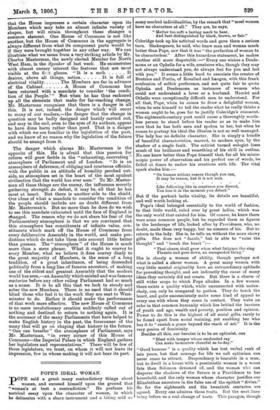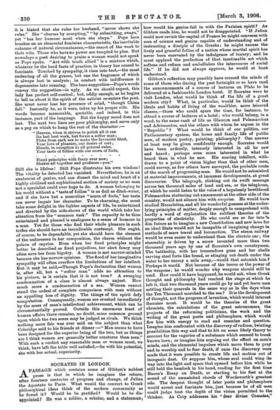POPE'S IDEAL WOMAN.
POPE said a great many contradictory things about women, and excused himself upon the ground that "woman's. at best a contradiction." He prefaces his metrical essay upon the character of women, in which he delineates with a sharp instrument and a biting acid so
many marked individualities, by the remark that "most women have no characters at all." They are, he says,
"Matter too soft a lasting mark to bear.
And best distinguished by black, brown, or fair."
Coleridge took up his satirical words and gave them a serious tarn. Shakespeare, he said, who knew man and woman much better than Pope, saw that it was "the perfection of woman to be characterless." After this hazardous statement, he makes another still more disputable :—" Every one wishes a Desde- mons or an Ophelia for a wife, creatures who, though they may not always understand you, do always feel for you and feel with you." It seems a little bard to associate the creator of Beatrice and Portia, of Rosalind and Imogen, with this frank confession of selfish preference, and not quite fair to quote Ophelia and Desdemona as instances of women who could not understand a lover or a husband. Hamlet and Othello were exceptionally difficult men to understand. For all that, Pope, when he comes to draw a delightful woman, when he sets himself to tell the reader what he really thinks a woman ought to be, goes far to justify Coleridge's comment. The eighteenth-century poet could cause a thoroughly worth- less person to stand before his reader so as to make hirn sure that he has both seen and spoken to her, but when he comes to portray his ideal the illusion is not so well managed. The lady has no definite character. She is simply a bundle of beautiful characteristics, marred, to modern eyes, by the shadow of a single fault. The satirist turned eulogist loses much of his brilliance and something of his skill in outline. No one knew ,better than Pope himself that, for all his micro- scopic power of observation and his perfect use of words, he failed at times to endow his creations with life. The vital spark eludes him :— "On human actions reason though you can,
It may be reason, but it is not man.
Like following like in creatures you dissect, You lose it in the moment you detect."
But if the portrait lacks vitality, its details are beautiful, and well worth looking at.
Pope's ideal belonged essentially to the world of fashion, to that little world, ruled over by great ladies, which was the only world that existed for him. Of course, he knew there were some common people, but he regarded them as figures in the landscape of life, looked after by Providence, who, no doubt, made them very happy, but no concern of his. But to return to the lady. She is, he tells us, without the more showy. gifts. She does not "dazzle," but is able to "raise the thought" and "touch the heart ":—
" That charm shall grow when what fatigues the ring Flaunts and goes down, an unregarded thing."
She is clearly a woman of ability, though perhaps not what is called a clever woman. A great many women with very little mental originality have an extraordinary aptitude
for provoking thought, and are indirectly the cause of many ideas they certainly did not create. But there is a charm of
still wider scope to which Pope alludes. In a few women there exists a quality which, while unconnected with melan-
choly, can only be compared to pathos. They do touch the heart, and quite unconsciously make some kind of appeal to every one with whom they come in contact. They wake an echo in that common humanity which lies behind the barriers of youth and age, wealth and poverty, position and opinion. Power to do this is the highest of all social gifts, rarely to be found apart from social training, yet enabling her who has it to "snatch a grace beyond the reach of art." It is the very genius of femininity.
Besides all this, our heroine is to be an optimist, one
"Blest with temper whose unclouded ray Can make to-morrow cheerful as to-day."
"Good humour" is a quality which has lost verbal rank of late years, but that courage for life we call optimism can never cease to attract. Despondency is bearable in a man, but to dwell in a house with a pessimistic woman is a worse fate than Solomon dreamed of, and the woman who can disperse the shadows of the future is a Providence to her household, and the only woman whose character justifies our Elizabethan ancestors in the false use of the epithet "divine." So far the eighteenth and the twentieth centuries are agreed. Every one admires these traits. But the next lines bring before us a real change of taste. This paragon, though it is hinted that she rules her husband, "never shows she rules." She "charms by accepting," "by submitting, sways," yet "has her humour most when she obeys." Pope here touches on an elemental feminine characteristic, the inevitable outcome of natural circumstances,—the resort of the weak to their wits. Those who have no power are tempted to plan. But nowadays a poet desiring to praise a woman would not speak as Pope spoke. "Art with truth allied" is a mixture which, whatever be the hard facts of practice, in theory has ceased to fascinate. Touched by sympathy, it rises into tact,—the most
endearing of all the graces, but one the fragrance of which is always lost in analysis ; in contact with indifference it degenerates into cunning. The bare suggestion—Pope's words convey the suggestion—is ugly. As we should expect, this lady has perfect self-control; but, oddly enough, as he begins to tell us about it the spirit of the satirist re-enters the poet. She must never lose her presence of mind, "though China fall." Instantly he, as it were, takes up his proper role. His words become memorable, quotable, and indeed, in this instance, part of the language. But the happy mood does not last. The next two lines are poor philosophy, and serve only as a peg on which to hang the rest of the character Heaven, when it strives to polish all it can Its last best work, but forms a softer man; Picks from each sex to make the favourite blest, Your love of pleasure, our desire of rest; Blends, in exception to all general rules, Your taste of follies with our scorn of fools, ........ •
Fixed principles with fancy ever new; Shakes all together and produces—yon."
Still she is lifeless! Still Pope illustrates his own wisdom ! The vitality he detected has vanished. Nevertheless, he is an anatomist of genius, and can dissect the mind and heart of a highly civilised and sophisticated section of society as no man not a specialist could ever hope to do. A woman belonging to his world without a "taste of follies" is as dull as ditch-water, and if she have but a masculine "scorn of fools," her taste can never impair her character. To be charming, she must take some delight in the lighter aspects of life, be entertained and diverted by the side-shows of the world which take her attention from the "common task." The capacity to be thus entertained and pleased is analogous to a sense of humour in a man. Yet for those who find their whole pleasure in such trifles she should have an ineradicable contempt. She ought, of course, to be dependable, yet she should have the element of the unforeseen in her composition, the charm without the poison of caprice. Even when her fixed principles might better be described as fixed prejudices, her alert fancy may often save her from bigotry. A woman is not narrow-minded because she has narrow opinions. The flood of her imaginative sympathy will often overflow the limitations of her intellect. But it may be said,—Though Pope's declaration that woman is, after all, but a "softer man" adds no attraction to his picture, is it certain that it is not true ? A sweeping condemnation of a class is almost always unjust. How much more a condemnation of a sex. Women cannot stand the ordeal of complete comparison with men without an appalling loss of dignity. The things of the spirit defy computation. Consequently, women are crushed immediately by the mass of man's intellectual achievement, which can be circumstantially proved. Outside this enormous tract of human affairs there remains, no doubt, some common ground 'upon which the two sexes may be judged as rivals. We think nothing more fair was ever said on the subject than what Coleridge said to his friends at dinner :—" Man seems to have been designed for the superior being of the two, but as things are I think women are generally better creatures than men." With such a verdict any reasonable man or woman must, we think, have left the table well satisfied,—he with his potential, she with her actual, superiority.















































 Previous page
Previous page